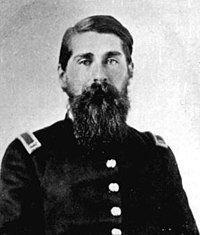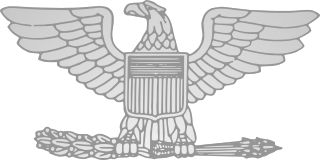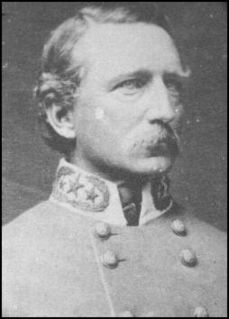
Albert Sidney Johnston served as a general in three different armies: the Texian Army, the United States Army, and the Confederate States Army. He saw extensive combat during his 34-year military career, fighting actions in the Black Hawk War, the Texas War of Independence, the Mexican–American War, the Utah War, and the American Civil War.

Pierre Gustave Toutant-Beauregard was an American military officer who was the first prominent general of the Confederate States Army during the American Civil War. Today, he is commonly referred to as P. G. T. Beauregard, but he rarely used his first name as an adult. He signed correspondence as G. T. Beauregard.
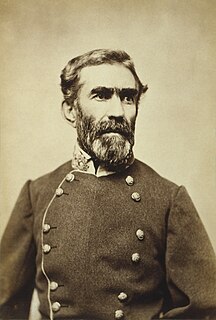
Braxton Bragg was a senior officer of the Confederate States Army who was assigned to duty at Richmond, under direction of the President of the Confederate States of America, Jefferson Davis, and charged with the conduct of military operations of the armies of the Confederate States from February 24, 1864, until January 13, 1865, when he was charged with command and defense of Wilmington, North Carolina. He previously had command of an army in the Western Theater.
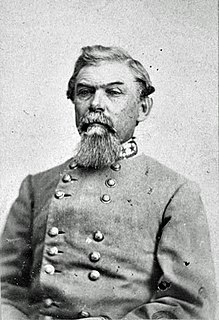
William Joseph Hardee was a career U.S. Army officer, serving during the Second Seminole War and in the Mexican–American War, where he was captured and exchanged. In the American Civil War, he sided with the South and became a general. Hardee served in the Western Theater and quarreled sharply with two of his commanding officers, Braxton Bragg and John Bell Hood. He served in the Atlanta Campaign of 1864 and the Carolinas Campaign of 1865, where he surrendered with General Joseph E. Johnston to William Tecumseh Sherman in April. Hardee's writings about military tactics were widely used on both sides in the conflict.

Stephen Dill Lee was an American soldier, and the youngest Confederate lieutenant general of the American Civil War. He was the first president of the Mississippi Agricultural and Mechanical College and served from 1880 until 1899.
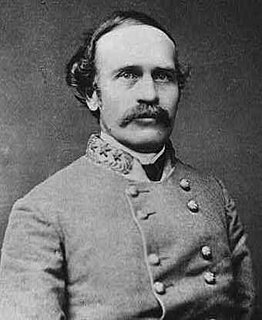
Bushrod Rust Johnson was a Confederate general in the American Civil War and an officer in the United States Army. As a university professor he had been active in the state militias of Kentucky and Tennessee and on the outbreak of hostilities he sided with the South, despite having been born in the North. As a divisional commander he managed to evade capture at the Battle of Fort Donelson, but was wounded at the Battle of Shiloh. He served under Robert E. Lee throughout the 10-month Siege of Petersburg, and surrendered with him at Appomattox.
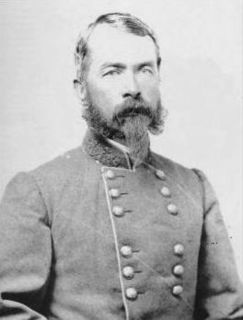
General Samuel Jones was a major general in the Confederate States Army during the American Civil War. At the midpoint of the war, he commanded the Department of Western Virginia, defending the Virginia and Tennessee Railroad and the vital salt mines. Later he commanded the district of South Carolina.

James Chesnut Jr. was an American politician who served as a Deputy from South Carolina to the Provisional Congress of the Confederate States from 1861 to 1862. He also served as a senior officer of the Confederate States Army in the Eastern Theater of the American Civil War.

The Western Theater of the American Civil War encompassed major military operations in the states of Alabama, Georgia, Florida, Mississippi, North Carolina, Kentucky, South Carolina and Tennessee, as well as Louisiana east of the Mississippi River. Operations on the coasts of these states, except for Mobile Bay, are considered part of the Lower Seaboard Theater. Most other operations east of the Mississippi are part of the Eastern Theater. Operations west of the Mississippi River took place in the Trans-Mississippi Theater.

States Rights Gist was a lawyer, a militia general in South Carolina, and a Confederate Army brigadier general who served during the American Civil War. A relative of several prominent South Carolinians, Gist rose to fame during the war but was killed at the Battle of Franklin on November 30, 1864. His name was based on the Southern states’ rights doctrine of nullification politics of his father, Nathaniel Gist. Nathaniel Gist was a disciple of John C. Calhoun and chose his son's name to reflect his own political sentiments.

Mansfield Lovell was a major general in the Confederate States Army during the American Civil War. As military commander of New Orleans when the city unexpectedly fell to the Union Navy in 1862, Lovell was fiercely criticised by local citizens for failing to predict a naval invasion. The Confederate government also heaped blame on him, to deflect attention from their own error in leaving so few troops to defend the city. A Court of Enquiry later cleared him of charges of incompetence, but his reputation never recovered.

John Cantey Villepigue was a corporal in the 118th Infantry, 30th Division which was federalized out of the South Carolina National Guard during World War I. He received the Medal of Honor for his actions during that war.

Richard Rowland Kirkland, known as "The Angel of Marye's Heights", was a Confederate soldier during the American Civil War, noted for his bravery and the story of his humanitarian actions during the Battle of Fredericksburg.

Zachariah Cantey Deas was a prominent Southern United States cotton broker and soldier. He served as a brigadier general in the Confederate States Army during the American Civil War.
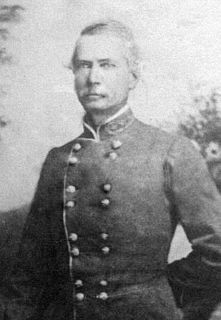
James Heyward Trapier was a career United States Army officer who fought during the Mexican–American War. He also served as a Confederate general during the American Civil War, dying shortly after its conclusion.

Adley Hogan Gladden was lieutenant colonel and second commander of the Palmetto Regiment of South Carolina volunteers during the Mexican–American War and a brigadier general in the Confederate States Army during the American Civil War. He impressed General Braxton Bragg after defending Pensacola from Union Army bombardment and after a brief assignment at Mobile, Alabama, he was brought to Corinth, Mississippi, to command a brigade in the Army of Mississippi. He was mortally wounded at the Battle of Shiloh.

David Bullock Harris was a Colonel in the Confederate States Army during the American Civil War. Harris served as an engineer, mostly under the command of General Pierre Gustave Toutant Beauregard. Harris planned and constructed the defenses of Centreville, Virginia, Fort Pillow, Island Number Ten, Vicksburg, Mississippi, Charleston, South Carolina and Petersburg, Virginia in the siege of that city's opening phase. Harris died of yellow fever at Summerville, South Carolina on October 10, 1864.
